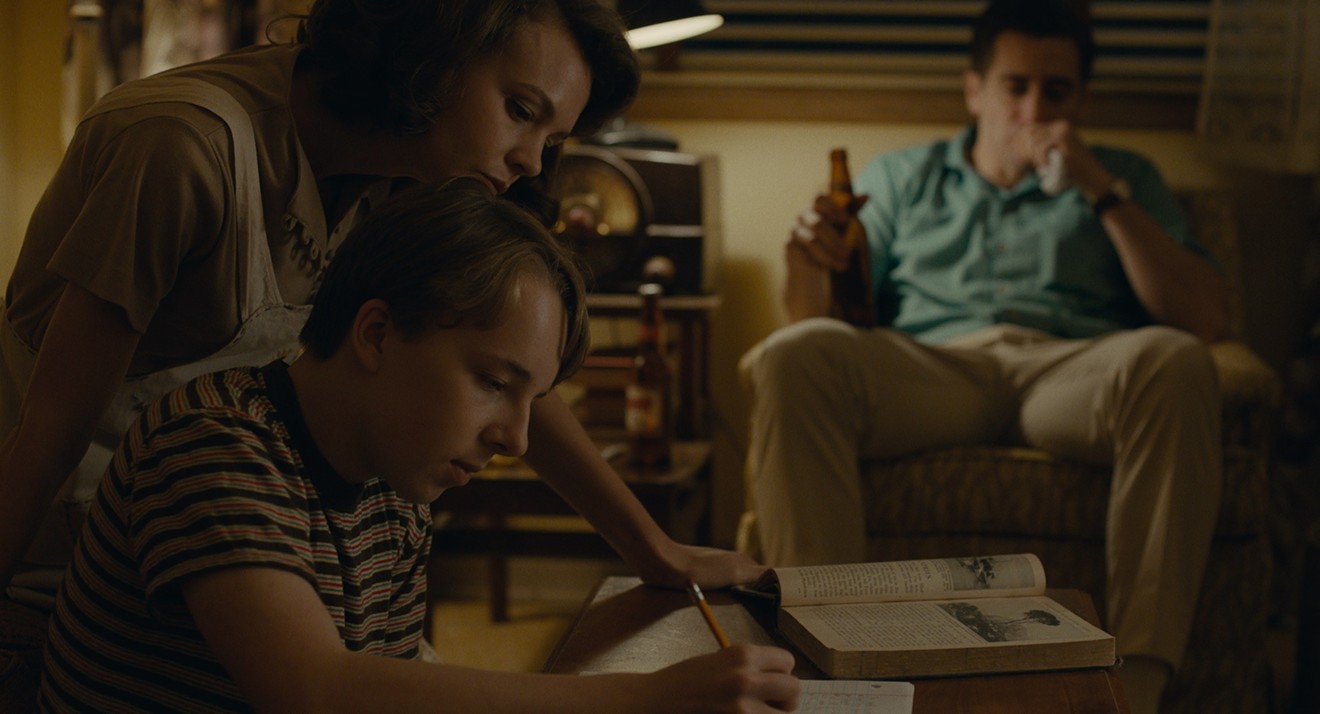“Tomorrow something will happen to make things feel different,” a character declares early in the incisive domestic drama Wildlife, the directorial debut of actor Paul Dano. Things suddenly becoming different is the promise of most contemporary movies, where the drabness of everyday life is forever being brightened up by surprise superpowers or opportunities for violent heroism. In Dano’s film, set in Montana in 1960, the thought is a fantasy. Nothing is going to make this small town or this family feel different, not even the unemployed father (Jake Gyllenhaal) lighting out to risk his life on a crew fighting wildfires for the summer, much to the disgust of his wife Jeanette (the superb Carey Mulligan). The couple has begun to discover that raw truth that, around 1960, American novelists and filmmakers were only starting to face in their art: that the post-war dream of a little house and a little family just might not be enough to ensure happiness.
Gyllenhaal dominates the first few scenes, playing a man too prickly prideful to accept an offer to return to the golf caddie job he’s been fired from, even as his disappointed wife, Jeanette, has had to take up part-time work teaching swim classes at the YMCA. Through the eyes of their son Joe (Ed Oxenbould), we understand the couple’s misery, though it’s not clear at first that Joe himself acknowledges its depths. He and the camera both seem to look away, a little stung, when observing that the father is sleeping on the couch these days. What is clear: The father sees an opportunity for escape — and the kind of camaraderie he’s missing — in leaving the family for the season with a team of poorly paid, barely trained firefighters. He wants to make things different.
And then he’s gone, and Wildlife belongs to Mulligan, whose bold, ferocious performance as a woman recklessly searching for change herself stands among the best in contemporary movies. Mulligan reveals Jeanette’s conflicting impulses, her struggle to honor all the roles in which life has cast her but also her sense that, even in this small town and with a teen boy to care for, she might have been given a second chance. To her mind, Jeanette has done everything right, has made the choices that should yield herself the middle-class American life she’s been promised. But now she’s hustling for work and beginning to consider the possibility that she might not have to stay in this dud marriage. After all, that well-heeled swimming student of hers who runs a local car dealership has been sniffing around.
That rich man, Warren (Bill Camp), starts hanging around the house and eventually invites Jeanette and Joe over for dinner. “This is my desperation dress. What do you think?” she says to young Joe, having with nervous calculation donned a black cocktail gown for a night out that he senses might kill any chance of his family reconciling. “I think dad would like it,” Joe responds. The long sequence that follows is an awkward beauty, a cover-your-eyes feat of discomfiting scene craft far more accomplished than you might expect from a first-time director. At the rich man’s table, Joe beholds a baldly transactional flirtation between Warren and Joe’s mother, while Warren moistly mouths a cigar and presses Joe to talk about his father. Jeanette is jittery and uncertain, drinking too much, sometimes lunging knowingly toward adultery and sometimes, sensing Joe’s disgust, primly shutting the possibility down.
Mulligan makes it clear that Jeanette is torn between the stability an affair might offer, her pleasure in Warren’s interest, the propriety she was raised with, the shame of the son watching all this and what appears to be the absence of any true spark between her and this moneyed lug. Jeanette is in many ways auditioning, trying to force things to be different, yet also scared to face what that might cost. The drinks keep flowing, and then she’s dancing — asking Joe to cha-cha, for God’s sake, while Warren relishes the show. And then it gets worse.
Dano’s film is shrewd and exacting, composed with rigor yet alert to the rhythms of its performers. He and Zoe Kazan adapted the script from Richard Ford’s novel of the same name, and what’s onscreen accurately reflects Ford’s precise portraiture of these people, their place and their time. One key to the story is that the adults count on Joe never to quite notice what’s going on around him or at least not to admit that he notices. Chief among Jeanette’s many conflicting needs is that Joe continue to play dumb, and she just barely bothers keeping a lid on what she and Warren eventually get up to. But Joe, too, has taken a part-time job to help the family out. He is apprenticed to a portrait photographer, and in quick, touching interstitial shots throughout the film, we see his posed photos of townspeople. The kid soon learns to see people’s essences and, in the end, despite his own heartache and embarrassment, to regard them with rare empathy, even his shattered, lonely parents. The director does, too. Wildlife is a major American film.
[
{
"name": "GPT - Billboard - Slot Inline - Content - Labeled - No Desktop",
"component": "16971022",
"insertPoint": "2",
"requiredCountToDisplay": "2"
},{
"name": "Editor Picks",
"component": "15769925",
"insertPoint": "4",
"requiredCountToDisplay": "1"
},{
"name": "Inline Links",
"component": "16575154",
"insertPoint": "8th",
"startingPoint": 8,
"requiredCountToDisplay": "7",
"maxInsertions": 25
},{
"name": "GPT - Rectangle 2x - Slot Auto-select - Labeled",
"component": "15782206",
"insertPoint": "8th",
"startingPoint": 8,
"requiredCountToDisplay": "7",
"maxInsertions": 25
},{
"name": "Inline Links",
"component": "16575154",
"insertPoint": "8th",
"startingPoint": 12,
"requiredCountToDisplay": "11",
"maxInsertions": 25
},{
"name": "GPT - Leaderboard to Tower - Slot Auto-select - Labeled",
"component": "15782207",
"insertPoint": "8th",
"startingPoint": 12,
"requiredCountToDisplay": "11",
"maxInsertions": 25
}
]












